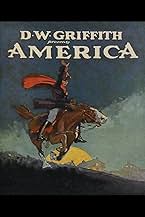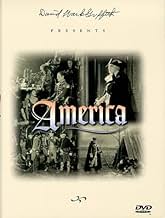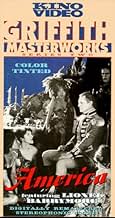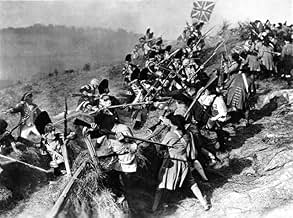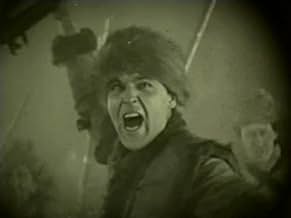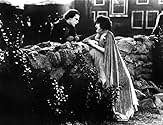Añade un argumento en tu idiomaThe story of a family caught up in the American Revolutionary War.The story of a family caught up in the American Revolutionary War.The story of a family caught up in the American Revolutionary War.
- Premios
- 1 premio en total
Lucille La Verne
- A Refugee Mother
- (as Lucile La Verne)
Paul Doucet
- Marquis de Lafayette
- (as H. Paul Doucet)
Argumento
¿Sabías que...?
- CuriosidadesThis film is regarded as a major turning point in the career of D.W. Griffith. Its critical and public failure ended Griffith's tenure as the industry's preeminent director.
- PifiasPaul Revere falls off his horse. For some reason, Griffith has Revere ride up the steps of people's homes to announce "The British are coming!" as if he has to shout this at their doors. Backing down one set of stairs, Revere's horse falls, tossing the actor, who quickly recovers and shows considerable concern for the horse's welfare. Griffith left in the spill.
- Citas
Nathan Holden: Love may come and love may go, and sigh like the wind from tree to tree. But I shall love no more, no more, till this fair maid come back to me.
- ConexionesEdited into The Negro Soldier (1944)
Reseña destacada
America (1924) tells the story of the American Revolutionary War through the perspectives of Nathan Holden (Neil Hamilton), a commoner who fights for the American cause, and the aristocratic Montague family, with whose daughter Nancy (Carol Dempster) Nathan has fallen in love. Their love is complicated not only by the class divide, but by conflicting political loyalties. Things are further complicated when Captain Butler (Lionel Barrymore) declares his love for Nancy as well. Supposedly, he is fighting for the British, but he has ambitions of his own that force the two sides to unite against a common enemy. Directed by DW Griffith.
SCRIPT: It seems obvious that Griffith is aiming to recapture the epic scale of BIRTH OF A NATION, and thankfully this film doesn't have as much racism as BOAN. The movie shows tightness in the battle scenes, and the reasons for the conflict are deftly sketched out. However, the movie takes a while to get going. The script has several issues: the clichéd story of "love at first sight" between Nathan and Nancy, told in groan-inducing purple prose; very shallow characterizations (especially Griffith's patronizing attitude toward daddy's girl Nancy, calling her a "little Tory" with "slight knowledge of politics"), and an overemphasis on Butler's villainy at the expense of the main conflict. I find Griffith's repeated tendency to place his heroine in the lustful hands of a brute annoying and distasteful, as well as his use of the word "savages" to describe Native Americans. The story told here just isn't very interesting, and some of the love scene title cards are really awful. SCORE: 4/10
ACTING: Hamilton and Dempster don't show much spark as a couple overall. Dempster in particular doesn't engage with her role as an aristocrat in the beginning; she just doesn't have the hauteur that you would expect and her character shows very little personality or depth. She does improve somewhat later on, providing some touching moments, but her performance suffers from Griffith's insistence on fashioning her after Lillian Gish. Neil Hamilton is too understated in the beginning but shows some feeling later, particularly in one scene where he has to make a very difficult choice. The romance between the two is never really convincing. Lionel Barrymore, though, steals the show in his scenes, playing the evil Captain Butler with sadistic glee and gusto. The other players are OK but not outstanding. SCORE: 5.5/10
CINEMATOGRAPHY/PRODUCTION: Many scenes in the first hour or so are presented in a stagy, tableaux-like fashion that may have been acceptable in 1914 but definitely not in 1924. The camera-work becomes more interesting once we get to Paul Revere's ride, but then goes rather static again. There were some overlong close-ups on Carol Dempster at times that appear to have been done after the main filming was complete, and she is directed to emote in a way that doesn't match the title cards or the context of the scene. SCORE: 5.5/10
SUMMARY: America stands as DW Griffith's last attempt at an epic-scale production. Although he tries to replicate the scale of BIRTH OF A NATION, the movie overall feels dull and uninspired. The script suffers from a corny, unconvincing central romance and shallow characterizations. The acting also suffers from a lack of charisma and inspiration, and the cinematography is unusually reserved and stiff, with just a few moments of visual interest. PLEASE NOTE: Griffith's antiquated insistence on using white actors for the black and Native American parts will not set well with many viewers, myself included, but thankfully this was the last time he would do so. SCORE: 5/10
SCRIPT: It seems obvious that Griffith is aiming to recapture the epic scale of BIRTH OF A NATION, and thankfully this film doesn't have as much racism as BOAN. The movie shows tightness in the battle scenes, and the reasons for the conflict are deftly sketched out. However, the movie takes a while to get going. The script has several issues: the clichéd story of "love at first sight" between Nathan and Nancy, told in groan-inducing purple prose; very shallow characterizations (especially Griffith's patronizing attitude toward daddy's girl Nancy, calling her a "little Tory" with "slight knowledge of politics"), and an overemphasis on Butler's villainy at the expense of the main conflict. I find Griffith's repeated tendency to place his heroine in the lustful hands of a brute annoying and distasteful, as well as his use of the word "savages" to describe Native Americans. The story told here just isn't very interesting, and some of the love scene title cards are really awful. SCORE: 4/10
ACTING: Hamilton and Dempster don't show much spark as a couple overall. Dempster in particular doesn't engage with her role as an aristocrat in the beginning; she just doesn't have the hauteur that you would expect and her character shows very little personality or depth. She does improve somewhat later on, providing some touching moments, but her performance suffers from Griffith's insistence on fashioning her after Lillian Gish. Neil Hamilton is too understated in the beginning but shows some feeling later, particularly in one scene where he has to make a very difficult choice. The romance between the two is never really convincing. Lionel Barrymore, though, steals the show in his scenes, playing the evil Captain Butler with sadistic glee and gusto. The other players are OK but not outstanding. SCORE: 5.5/10
CINEMATOGRAPHY/PRODUCTION: Many scenes in the first hour or so are presented in a stagy, tableaux-like fashion that may have been acceptable in 1914 but definitely not in 1924. The camera-work becomes more interesting once we get to Paul Revere's ride, but then goes rather static again. There were some overlong close-ups on Carol Dempster at times that appear to have been done after the main filming was complete, and she is directed to emote in a way that doesn't match the title cards or the context of the scene. SCORE: 5.5/10
SUMMARY: America stands as DW Griffith's last attempt at an epic-scale production. Although he tries to replicate the scale of BIRTH OF A NATION, the movie overall feels dull and uninspired. The script suffers from a corny, unconvincing central romance and shallow characterizations. The acting also suffers from a lack of charisma and inspiration, and the cinematography is unusually reserved and stiff, with just a few moments of visual interest. PLEASE NOTE: Griffith's antiquated insistence on using white actors for the black and Native American parts will not set well with many viewers, myself included, but thankfully this was the last time he would do so. SCORE: 5/10
- CJBx7
- 13 feb 2014
- Enlace permanente
Selecciones populares
Inicia sesión para calificar y añadir a tu lista para recibir recomendaciones personalizadas
Detalles
- Duración2 horas 21 minutos
- Mezcla de sonido
- Relación de aspecto
- 1.33 : 1
Contribuir a esta página
Sugerir un cambio o añadir el contenido que falta

Principal laguna de datos
By what name was América (1924) officially released in Canada in English?
Responde
